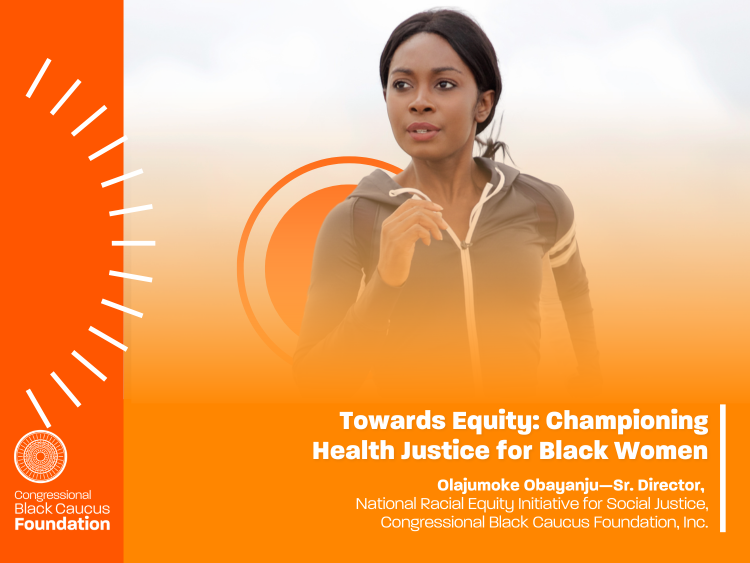By: Olajumoke Obayanju—Sr. Director, National Racial Equity Initiative for Social Justice, CBCF
As National Women’s Health Week unfolds, it’s imperative to shine a spotlight on the enduring healthcare disparities that disproportionately impact Black women. It’s crucial to recognize the distinct challenges Black women face in healthcare and advocate for systemic reforms that prioritize health equity.
Despite strides in medicine, Black women persistently grapple with alarming rates of chronic illnesses such as hypertension, diabetes, obesity, and various cancers. Cardiovascular diseases alone kill more than 50,000 Black women annually. Maternal mortality rates among Black women persist at 3 to 4 times the rate of white women, highlighting a profound disparity in maternal healthcare. Additionally, Black women are 3 times more likely to have fibroids than white women.
These alarming statistics highlight the urgent need for targeted interventions to address the specific healthcare needs of Black women and ensure equitable access to healthcare services.
Black women’s voices are often silenced, their concerns dismissed, and their health outcomes disregarded. In healthcare interactions, 71% of Black women aged 18 to 49 and 54% of Black women 50 and older report experiencing at least one negative encounter with a healthcare provider. At the heart of these disparities lies a disturbing truth: systemic racism and historical injustices have woven a tapestry of inequity that disproportionately burdens Black women.
For far too long, Black women have borne the brunt of healthcare disparities, facing barriers at every turn that hinder their access to quality care. These barriers are not isolated incidents but are deeply rooted in systemic racism, a pervasive force that infiltrates every facet of society, including healthcare systems. Historical injustices, from the exploitation of Black bodies for medical experimentation to the denial of basic reproductive rights, have left a lasting imprint, shaping the healthcare experiences of Black women today. Moreover, the intersectionality of race, gender, and socioeconomic status compounds the challenges faced by Black women and further exacerbates disparities in access to care, treatment options, and health outcomes.
To confront these injustices, we must first acknowledge the role of systemic racism and historical injustices in shaping healthcare disparities. We must challenge the status quo by advocating for policies and practices that prioritize equity, diversity, and inclusion within healthcare systems. This requires not just superficial changes but a fundamental shift in the way policymakers approach healthcare, centering the voices and experiences of those most marginalized. Healthcare providers must undergo anti-racism training and cultural competency education to better understand and address the unique needs of Black women. Representation matters, both in leadership roles within healthcare institutions and in research and clinical trials, to ensure that healthcare decisions are informed by diverse perspectives. Community-driven initiatives and grassroots organizations are crucial in bridging the gap in healthcare access and advocating for the rights of Black women. By amplifying the voices of Black women and supporting their efforts, we can strive towards a future where every Black woman receives the care, respect, and dignity she deserves.
May we continue to confront these injustices head-on and pave the way for a healthcare system that truly prioritizes equity and justice for all.
